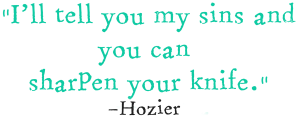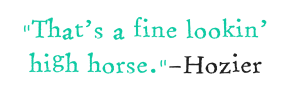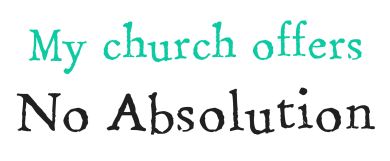My good friend Kimber introduced me to this song a few weeks ago, and it’s been on repeat ever since. Some of the lyrics are so powerful, I felt compelled to write them down. There is one in particular that has really stayed with me, and I’m not even sure I’m hearing it right. Before we go in to why that is so important, let’s talk a little about the song.
In a Youtube Interview, Hozier stated that the song is not so much an indictment against religion as it is against “institutions that would undermine some of the more natural parts of being a person.” Nevertheless, churches around the world have condemned the song as an attack on faith and a belief system that has been in place for hundreds of years. The song itself was written in acknowledgement of the struggles members of the LGBT community face daily, but the message is one that reaches beyond those bounds to encompass all aspects of life.
I was raised in a Christian home. For a great many years, I practiced the faith, read my bible and attended church. A  significant personal tragedy not only caused me to turn my back on my faith, it led me to question it altogether. Does God really exist? Is there really such a thing as higher power? I struggled with these questions for years, eventually coming to the singular conclusion that there was no way to really know. As a result, I found myself less inclined to believe in the teachings of the church and even more critical of the hypocrisy prevalent in a culture seemingly built on a foundation of intolerance and subjugation.
significant personal tragedy not only caused me to turn my back on my faith, it led me to question it altogether. Does God really exist? Is there really such a thing as higher power? I struggled with these questions for years, eventually coming to the singular conclusion that there was no way to really know. As a result, I found myself less inclined to believe in the teachings of the church and even more critical of the hypocrisy prevalent in a culture seemingly built on a foundation of intolerance and subjugation.
They call people like me Agnostic. I do not believe in God any more than I deny his existence. I choose instead to live a life of morality, based not on the tenants of faith, but rather the mandates of my own personal conscience: Live and let live. Help when you are able. Be honest and fair. Have compassion and empathy. These sound a lot like the basis for Christian faith, do they not? In fact, every major religion in the world preaches these things in one form or another. The most significant difference between what I practice and what religion teaches, can be found in a single word- Absolute.
Absolute is the absence of imperfection.  It cannot be disqualified or diminished in any way. It is universally valid and cannot be seen any other way. It is black and white. It is perfect. Right is right, wrong is wrong. The church preaches absolutes dictated by standards carved in stone. There is no give. No allowance.
It cannot be disqualified or diminished in any way. It is universally valid and cannot be seen any other way. It is black and white. It is perfect. Right is right, wrong is wrong. The church preaches absolutes dictated by standards carved in stone. There is no give. No allowance.
“My church offers no absolutes.” Most agree this is the correct wording. It is a powerful testament and one that touches me on a deep level. Death is the only absolute. It is the great equalizer, the one indelible truth proven both by science and religion. There is not a living being that can escape it. We can delay it, ease it and postpone it, but we cannot prevent it. Beyond death, there are no absolutes. Right is not always wrong. A gray area exists in the conscience of every human being that cannot be defined with absolutes.
But when I hear this song, I do not hear “absolutes”.
I choose to live a life separate from organized religion. I base my decisions on conscience and empathy. I do not sit in judgement. My actions are not measured by the testaments of others, but rather the inner knowledge that I have committed all that I am. If I have done what I can, helped where I am able, been fair, honest and just, than I have fulfilled the commands of my conscience. I neither believe nor disbelieve in the existence of a higher power. Judgement is not final. It is perpetual. I am held to account every time I look in the mirror. My sins haunt my dreams. I cannot function under the weight of a conscience made heavy by wrong. No matter the time or distance between this moment and that, I will pay penance until my own soul is clean. It is in that regard that I have become a church unto myself.
Absolution is the formal release from guilt, obligation, or punishment. Because I choose to live my life based solely on the commandments of my own conscience, no being, human or divine, can absolve my sins.

